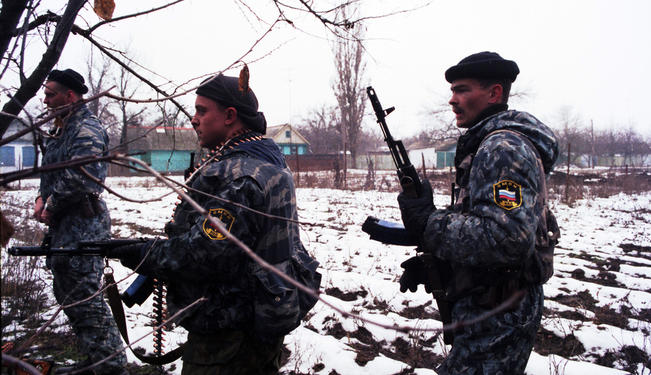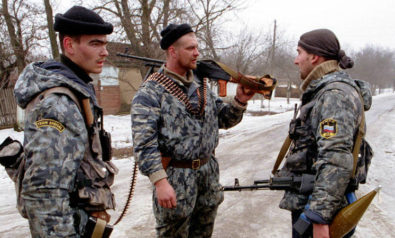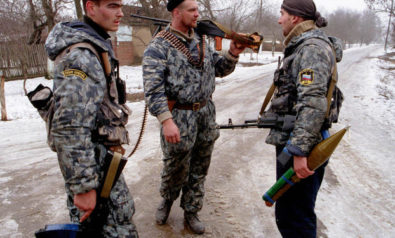It is time Russia found a solution to secessionist movements like Chechnya.
Background
Nestling between the Black and Caspian seas, the North Caucasus is home to a number of separatist movements, many of whom have grown into violent struggles over the past few decades and are now increasingly threatening Russia’s national interests and security.
Most of the territories at the heart of these movements are federal subjects of Russia, and have been demanding either whole or partial autonomy or campaigning for absolute freedom from Moscow’s rule for a long time. Of these, the movements centring Chechnya, Dagestan, Ingushetia, North Ossetia, and Tatarstan, have historically been the most robust and often bloody. Chechnya, in particular, remains a thorn in the side of the Russian Federation by continually drawing global attention to its armed struggle against, what it calls, Moscow’s oppressive rule and alleged gross human rights violations.
In April 2013, international media glare once again turned to the Caucasian movement after two Chechen brothers, Dzokhar and Tamerlan Tsarnaev, bombed the Boston Marathon.
Armed struggle in what is now known as Chechnya dates back to the 18th century, making it arguably the world’s oldest separatist struggle in the modern history. One of the 21 republics within the Russian Federation situated in the southwest, Chechnya is home to a million people with a mix of Muslim and orthodox Christian populations, and has a long history of insurrection against the Russian rule.
After the disintegration of the Soviet Union in 1991, 15 republics were allowed to become independent from Russian rule, but Chechnya was not one of them. It was argued that Chechnya was an autonomous region and not a constituent republic, and therefore, did not have a right to secede. The decision resulted in Chechnya declaring independence shortly afterwards, which led to two wars with the Federation in 1994 and 1999 respectively.
The first war lasted two years and killed up to a 100,000 people amid grave accusations of beheadings, kidnappings, rape, torture, and extrajudicial executions.
The second war, led by extremist Chechen warlord Shamil Basaev, started in 1999 and sparked an Islamist uprising in the neighbouring Dagestan. Enraged by the rebellion, Russian forces invaded Chechnya a second time. The second Chechen War saw even more vicious fighting and large-scale destruction. Once again, both sides were accused of gross human rights violations and torture. Later forced to retreat, the Chechen rebels then resorted to guerrilla fighting and committing, what Russia called, acts of terror against the state, including the Beslan elementary school siege — that killed 334 people, including 186 children — the bombing of the Moscow subway, and the hostage crisis at a Moscow theatre that killed 120 people.
In 2010, Russia declared an end to its 10-year anti-terror "operation," stating that the Chechen rebels were largely neutralized. In 2007, Ramzan Kadyrov was elected Chechen president with backing from the Kremlin. Whilst some credit him for restoring order and stability to Chechnya, he is also accused of corruption and human rights violations.
By installing Kadyrov as president, Moscow was able to declare victory over the rebels and hoped to sideline the Salafist jihadists in Chechnya by striking a deal with the more religiously moderate Sufis, of which Kadyrov was one.
However, critics argue that Moscow’s gamble appears to have fallen apart. The Chechen nationalist movement has now been replaced by the Caucasus Emirate, an Islamic extremist insurgency movement and one that has been classed as a terrorist organization by the United States. According to Russian authorities, the movement has engaged in terrorist activities since early 2000 and carries links to al-Qaeda.
Why are Russia's Separatist Movements Relevant
Reigniting global debate over Russia’s bloodiest secessionist movement, the bombing of Boston Marathon by the Tsarnaev brothers has more importantly drawn attention to the starkly evolved character of the Chechen struggle in the last 20 years: the cause is no longer nationalist but predominantly an Islamist one. Having taken deep roots in the region, including Dagestan and Ingushetia, the Jihadi ideology of Chechen rebels is now acting as a unifying theme, linking their cause with conflicts beyond the region such as in Afghanistan and Syria.
Setting a dangerous precedent, the Tsarnaev brothers have also brought the Chechen struggle out of Russia for the first time. Earlier militant campaigns were limited to targeting Russian interests within the Federation, but the Boston Bombings have now expanded the playing field for the rebel movement, sparking global concerns. According to the Pew Research Centre, nearly 57% of Muslims in the Caucasus region are now concerned about Islamic extremist groups in their countries.
Considering the fragile political environment in the Middle East, North Africa, and Southeast Asia, any shift in sentiments in nationalist struggles across the globe on the lines of religion can potentially have a destabilizing effect on several regions in the world. This may include terrorist attacks not just in Russia and Central Asia, but also the rest of the world.
Image: Copyright © Shutterstock. All Rights Reserved
For more than 10 years, Fair Observer has been free, fair and independent. No billionaire owns us, no advertisers control us. We are a reader-supported nonprofit. Unlike many other publications, we keep our content free for readers regardless of where they live or whether they can afford to pay. We have no paywalls and no ads.
In the post-truth era of fake news, echo chambers and filter bubbles, we publish a plurality of perspectives from around the world. Anyone can publish with us, but everyone goes through a rigorous editorial process. So, you get fact-checked, well-reasoned content instead of noise.
We publish 2,500+ voices from 90+ countries. We also conduct education and training programs on subjects ranging from digital media and journalism to writing and critical thinking. This doesn’t come cheap. Servers, editors, trainers and web developers cost money.
Please consider supporting us on a regular basis as a recurring donor or a sustaining member.
Support Fair Observer
We rely on your support for our independence, diversity and quality.
Will you support FO’s journalism?
We rely on your support for our independence, diversity and quality.










